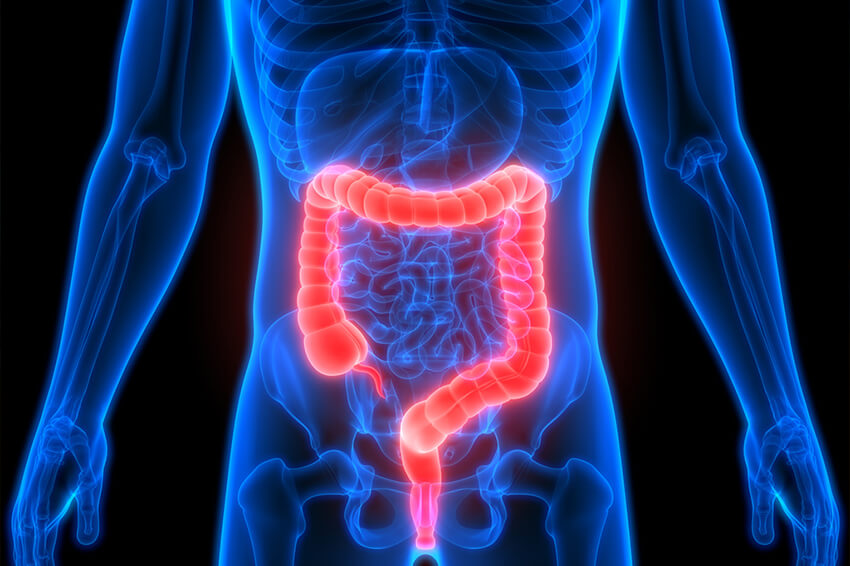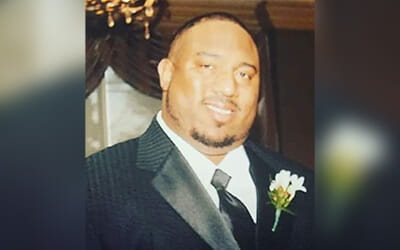How I found out I had colon cancer at 48 (and why colonoscopies are so important)

James Anderson is a 48-year-old pipeliner with Chester Laborers Local Union 413. After a work injury, he went to get a routine physical to be approved to go back to work. He thought it was unusual when the doctor called him at seven o'clock at night.

Anderson already had plans that evening so the doctor said he could go first thing in the morning. The very next day, Anderson showed up at Riddle Hospital.
"They started filling me with blood and told me I'd be there for a couple days," he says. "I didn't know what was going on; I was scared."
More tests — then a colonoscopy
That night, testing continued with MRIs and CAT scans. The next day, Anderson recalls being scheduled for a colonoscopy.
"The guy showed me pictures when he walked into the room. I was really scared then. He showed me what it looked like in the films. There were different clips showing different sections all the way through until they got to the cancer part, then you could see the tumor. That's how I found out I had colon cancer."
The tumor was malignant and would need to be surgically removed ASAP.
The surgery would be performed by Sumedh D. Kakade, MD, who specializes in minimally invasive colorectal surgery, using advanced laparoscopic and robotic-assisted techniques.
"I started praying," Anderson says. "But Dr. Kakade was great. He walked me through what was going to happen. He talked to me about cancer and how I was going to feel after the surgery. They told me I was flipped upside down during the surgery but I didn't remember anything once they put me to sleep."
"I realized Mr. Anderson had some fear going into the surgery as everything happened so unexpectedly for him," says Dr. Kakade. "I wanted to help put his mind at ease while also setting realistic expectations about recovery from colorectal surgery. It's important for patients to know this is a team effort and we're going to work together towards the best possible outcome."
Recovery from colorectal surgery and why chemo
Anderson's surgery involved removal of about a foot and a half of his colon. After colorectal surgery, he recovered at Riddle Hospital for about five days.
"The system has to reset," Anderson explains. "They put you on a liquid diet, eating broth, sherbet, stuff like that. Then they ease things into you to help you start going to the bathroom."
Colorectal cancer surgery patients must have a solid bowel movement and be able to move around somewhat independently before they're ready to be discharged to home.
After Anderson returned home, he went for his first appointment with Benjamin Jacobs, MD, an oncologist also affiliated with Riddle Hospital.
"Dr. Jacobs explained what he was going to do and also what I needed to do to get better," Anderson reflects. "When you have a surgery like that, there's a 60% chance of the cancer not coming back. If I did the chemo, there would be around 85% chance that it wouldn't come back. I decided to get the chemo; I figured I was too young."
"I would never have got the colonoscopy to be honest. I only got it because I had to. A lot of people think it's disgusting, or they're scared to get it, but it might save your life. I try to encourage people to go get it no matter what. Besides, you're asleep so you don't know what's going on." – James Anderson, 48, colon cancer survivor
Anderson underwent five doses of treatments of chemotherapy every three weeks. First, he had a port placed in his chest by William H. Ayers, MD, FACS. Dr. Ayers explained that chemo treatment through the port would be virtually painless vs. through an IV, which would cause a burning sensation in the veins.
For chemo treatments themselves, Anderson reported to Dr. Jacobs' practice.
Still, says Anderson, "I think the first and second treatment weren't that bad, but the third and fourth ones really wiped me out. I was really weak. It was hard for me to get up and down the steps. Luckily, my mother and son live with me, and they helped me out a lot."
Though disheartened at times along his recovery journey, Anderson has a great support system. He was sharing about his experiences on Facebook and people were leaving messages of encouragement and prayers, telling him to hang in there because he only had one more chemo treatment to go.
Anderson's last chemo treatment for colon cancer was August 2021.
Life after colon cancer at 48 years old
"Since then I feel okay, still a little weak, other than that, just trying to walk around and get back to work," Anderson says.
"How I found out I had colon cancer is probably not the best way," he advises. "I would never have got the colonoscopy to be honest. I only got it because I had to. A lot of people think it's disgusting, or they're scared to get it, but it might save your life. I try to encourage people to go get it no matter what. Besides, you're asleep so you don't know what's going on."
Adds Dr. Kakade, "As a colon cancer specialist, I can't stress enough the importance of getting colorectal screenings, starting at age 45, regardless of genetic risk and other factors. Colon cancer symptoms are very difficult to detect because they often mimic other health conditions. Therefore, the disease may advance undetected for years, until it's too late. Unless, of course, you get colon cancer screenings, which are only once every 10 years for most people."
"Colon cancer symptoms are very difficult to detect because they often mimic other health conditions. Therefore, the disease may advance undetected for years, until it's too late. Unless, of course, you get colon cancer screenings, which are only once every 10 years so it's not an annual thing." – Sumedh D. Kakade, MD, Colorectal Surgeon, Riddle Hospital
Because of Anderson's experience and sharing with friends and family, a few people in his life who are in the same age range have also gotten themselves checked out.
"Since they saw what I went through, they're glad they got it done and didn't mind doing it at 45 instead of 50 and waiting to see what's going to happen."
There's also research suggesting that younger people and communities of color are more at risk for colon cancer, for a variety of reasons. Sedentary lifestyles, for example, along with eating high-fat, processed foods that are lacking in fiber and nutrients have a tremendous effect on digestive health, and therefore, the colon.
An unusual finding published in the Journal of the National Cancer Institute indicated that the right side of the colon ages faster in African American patients. In white patients, the left side of the colon ages faster. As it turns out, right-sided aging presents a more serious risk, tending to produce bigger, more advanced tumors than left-sided aging.
Sociodemographic factors also come into play as people of color disproportionately lack insurance and access to high-quality health care than white patients. This creates a barrier when it comes to routine screenings and exams like colonoscopies.
For patients who do have access to affordable quality health care, some may be reluctant to get the care available to them due to lack of trust in the health care system. Others may be uncomfortable with the idea of a colonoscopy screening and what's involved.
As for Anderson, he's glad the doctors found colon cancer early, and he agrees with the medical advice.
"Get yourself checked out while you're young!" he says. "Otherwise, you might have to pay for it in the long run."
Next steps:
Learn more about gastroenterology care at Main Line Health
Learn more about colorectal cancer care at Main Line Health
How to recognize the silent symptoms of colorectal cancer